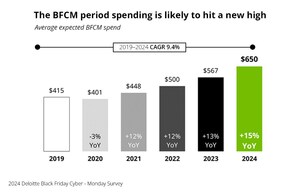Global Competitors Threaten U.S. Lead in Mobile Broadband: Deloitte Report
New spectrum policy and accelerated investment in 4G technologies needed to secure U.S. leadership
NEW YORK, Sept. 27, 2012 /PRNewswire/ -- The United States' global leadership position in fourth generation cellular wireless networks (4G) is at risk as other countries make significant investments in mobile broadband innovation, according to a new Deloitte report.
The report contends that the costs of freeing up spectrum to handle the growth of commercial mobile broadband services should be compared to the economic benefits that result, including increased tax revenues. Deloitte notes that its analysis indicates mobile broadband network investments over the period 2012-2016 could expand U.S. GDP between $73 and $151 billion, and account for between 371,000 and 771,000 jobs. Moreover, the benefits are becoming more widespread as 4G technology is applied to business enterprises in addition to consumer applications.
Examining the country's shrinking lead in mobile broadband, the Deloitte report, "Airwave overload? Addressing spectrum strategy issues that jeopardize U.S. mobile broadband leadership," suggests fundamental policy changes addressing spectrum management are needed.
"While a century of U.S. spectrum policies has served the country well, continued accelerated investment in 4G and related technologies is required for the U.S. to retain its global lead in mobile broadband and reap the associated benefits in GDP and job growth," said Craig Wigginton, U.S. telecommunications sector leader, Deloitte LLP. "For this, the U.S. must not only head off a spectrum shortage, but show the way in adopting a policy framework that can better meet the requirements of the 21st century marketplace."
The report introduces the "Mobile Communications National Achievement Index" which uses 15 indicators to track the vitality and competitiveness of national wireless sectors in 20 countries from 2004 to 2011. It provides evidence of U.S. leadership but indicates that the gap is shrinking as U.S. annual scores decline while countries in Asia and Europe gain ground.
It notes that America's innovation in mobile broadband is far from assured, as other countries such as China, India, Japan, Singapore and South Korea are aggressively upgrading their wireless broadband infrastructure. These countries have made steady gains over the last decade with government support and investment through tax incentives, research and development (R&D) funding, and end-user subsidies.
(Photo: http://photos.prnewswire.com/prnh/20120927/NY81436 )
Note:
- Scandinavia includes Denmark, Finland, Norway, and Sweden
- Other Europe includes France, Germany, Netherlands, Portugal, and the United Kingdom
- Other Asia includes Japan, Korea, and Singapore
- Rest of World includes Australia, Brazil and South Africa
The report shows that despite efforts by U.S. telecom carriers and the government to augment network capacity, mobile broadband demand growth threatens to overwhelm the system.
"To secure U.S. leadership, carriers need to keep up with the surge in 4G demand fueled by a multitude of innovative devices and an explosion in applications," added Dan Littmann, principal, Deloitte Consulting LLP. "And to do that the carriers need more spectrum, which means finding ways for government to reallocate frequencies now used by various private-sector entities and government agencies. Otherwise, we risk losing jobs and profits to global competitors."
Demand is likely to intensify as mobile broadband is embraced not only by consumers but by an array of sectors, including automotive telematics, vehicle traffic management, and mobile health care. Without adequate spectrum supply, U.S. wireless networks could encounter capacity constraints, putting a drag on the U.S. economy and opening the door for competitors abroad to gain further ground.
"While the U.S. currently leads the world in mobile broadband, the aim should be to remain number one – not become one of the top ten – unfortunately policy gray areas make spectrum reorganization a threat to this lead," said Phil Wilson, director, Deloitte Consulting LLP.
The fundamental policy changes required to avoid stifling the innovation that is responsible for America's global leadership in mobile broadband include:
- Develop an official U.S. spectrum strategy aimed at resolving policy ambiguities that hamper effective mobile broadband decision making.
- Treat the costs incurred in making sufficient spectrum available for commercial mobile broadband as investments with a return that is realized over time in the form of increased GDP and tax revenue.
- Make a successful television broadcast spectrum auction a top priority toward meeting the 2020 goal of freeing up 500 MHz of spectrum for mobile broadband.
- Expand government funded or supported R&D efforts to explore the potential of spectrum sharing as a means to boost mobile broadband capacity.
- Continue to leverage traditional auctions combined with viable secondary markets to ensure not only an adequate supply of spectrum but also that spectrum is used with maximum efficiency and timeliness.
- Allocate spectrum in large blocks based on technically-driven criteria to alleviate constraints caused by the crowded, fragmented legacy-spectrum zoning map.
- Conduct principles-based license renewal reviews as a means to ensure that license holdings and spectrum policies are aligned with changing technological and economic realities.
The report concludes that without new policy initiatives, U.S. capacity expansion could be insufficient to ensure adequate spectrum supply. Lack of spectrum availability or policies that allocate spectrum in a manner that fails to reinforce industry health and consumer affordability would constrain the U.S. wireless industry and the associated ecosystem.
To download a copy of the full report, go to www.deloitte.com/us/spectrum.
About the Mobile Communications National Achievement Index
Deloitte's "Mobile Communications National Achievement Index" tracks the annual performance of 20 countries around the world from 2004-2011 to compare the vitality and competitiveness of wireless sectors globally. The Index uses a selected set of 15 global competitiveness indicators that measure end-user benefits and the health of the wireless industry for each country. By understanding movements in country indices, industry leaders and policymakers can gain an objective view of how the U.S. stacks up in the global mobile broadband marketplace, and can develop policies and strategies to protect strengths and address competitive weaknesses.
About Deloitte's Technology, Media & Telecommunications Practice
Deloitte's technology, media & telecommunications practice is comprised of more than 1,400 clients in the U.S., including the vast majority of market category leaders across all sector segments. Deloitte practitioners, many with direct industry experience, deliver a breadth of services including professional audit, consulting, enterprise risk management, financial advisory and tax. The practice is also home to the Deloitte Center for the Edge, which conducts original research and develops substantive points of view for new corporate growth. The Silicon Valley-based Center helps senior executives make sense of and profit from emerging opportunities on the edge of business and technology.
As used in this document, "Deloitte" means Deloitte LLP and its subsidiaries. Please see www.deloitte.com/us/about for a detailed description of the legal structure of Deloitte LLP and its subsidiaries. Certain services may not be available to attest clients under the rules and regulations of public accounting.
SOURCE Deloitte
WANT YOUR COMPANY'S NEWS FEATURED ON PRNEWSWIRE.COM?
Newsrooms &
Influencers
Digital Media
Outlets
Journalists
Opted In






Share this article